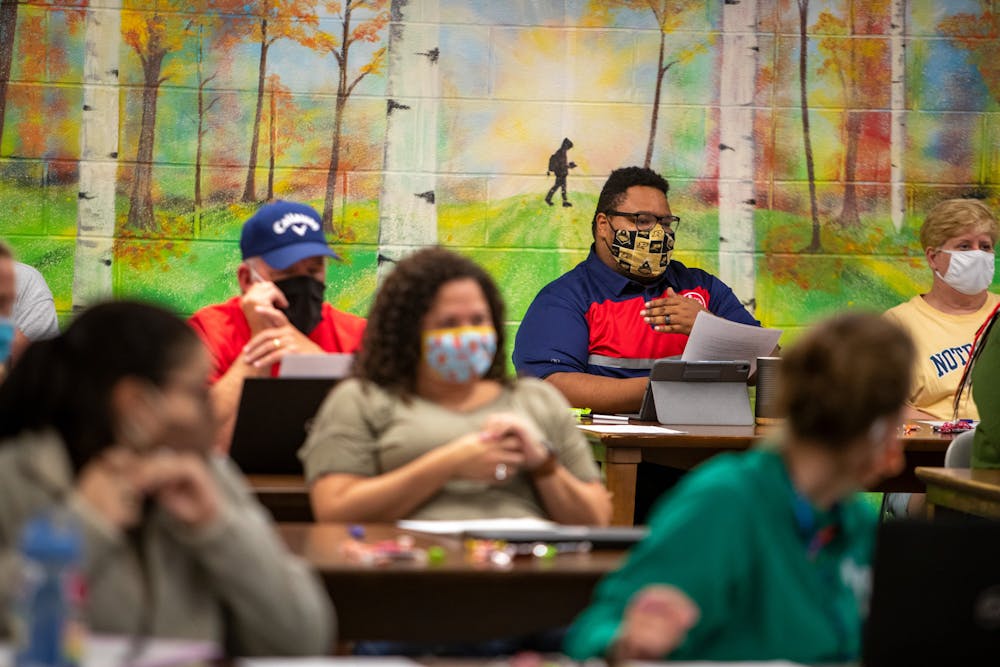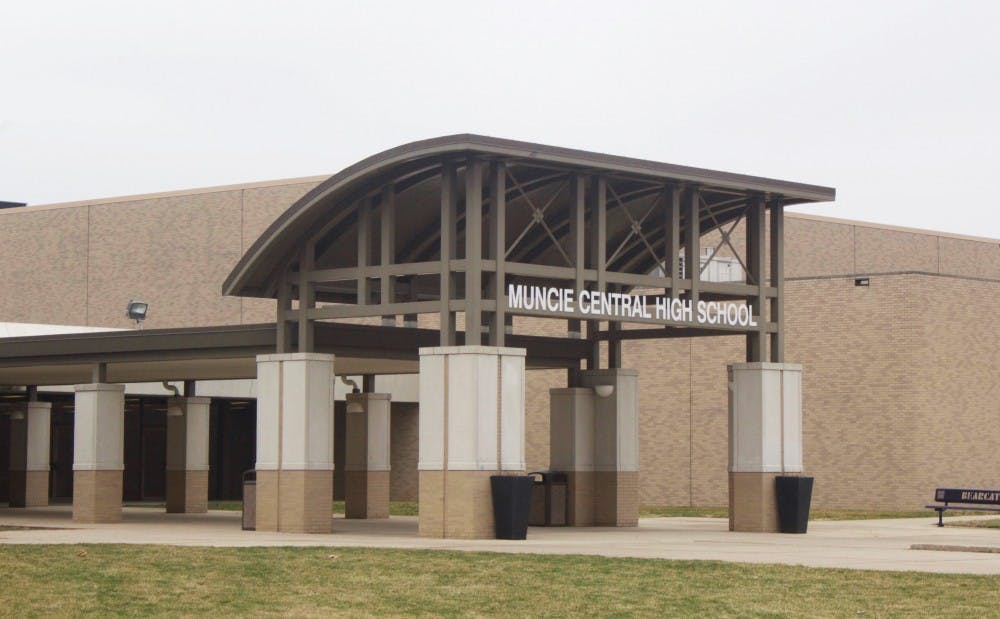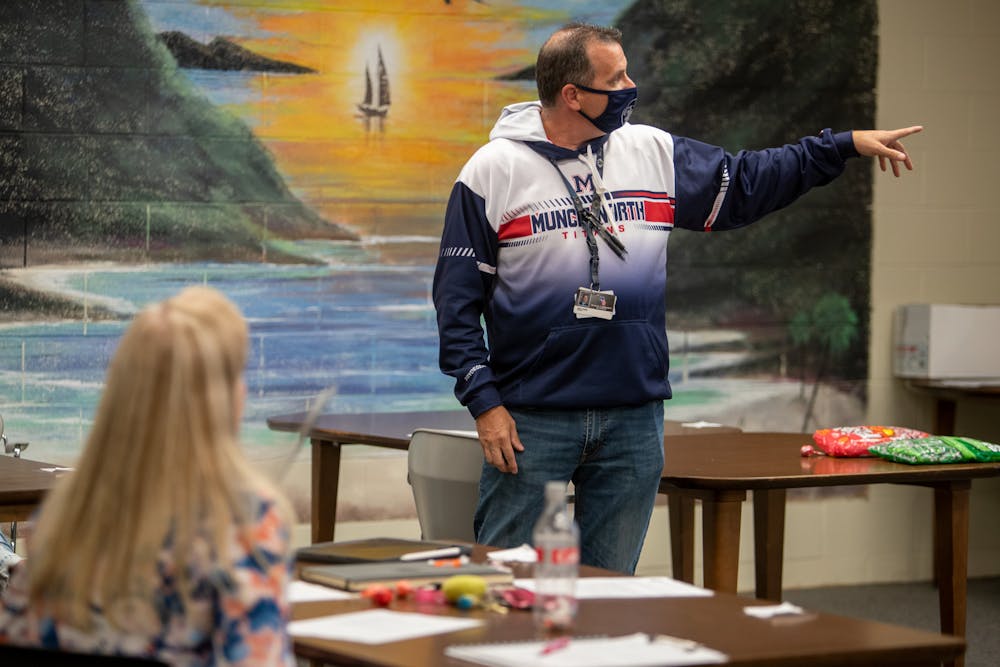Editor's Note: This story is part of The Partnership Project, a series of content written in an effort by The Daily News to follow the formal collaboration of Ball State University and Muncie Community Schools. Read more in this series here.
Chuck Reynolds grew up in Muncie, but he didn’t go to Muncie Central High School.
He went to Muncie Southside when it was still a high school. A graduate of the class of 1993, he was the assistant superintendent of Richmond Community Schools when he got an offer to become the associate superintendent of Muncie Community Schools (MCS) in March 2019.
Before becoming the assistant superintendent in Richmond, Indiana, Reynolds was the band director at Muncie Southside and ascended to assistant principal, then principal of the school.
“Muncie changed my life,” Reynolds said. “I wanted to give back to Muncie to help kids like me and to help provide a good education, so they could make better choices for themselves.”
Another person who wanted to help kids in MCS was LeeAnn Kwiatkowski. When the proposal for Ball State University to take over MCS was approved, Kwiatkowski was working for the governor’s office as a senior education advisor.
In July 2019, Kwiatkowski, nicknamed “Dr. K” by those in the community, was appointed to be the director of public education and chief executive officer of MCS. Since her ascension to the position, she has worked with Ball State to form a partnership.
One facet of this partnership is the Academic Innovation Summit, a day-long conference where speakers from across Ball State and the country come to speak to MCS educators to help promote student success. The idea came from the Academic Innovation Council, formed at the onset of the partnership between Ball State and MCS.
Kwiatkowski said it had been years since staff members had opportunities for professional growth and development.
“So we thought, let's create a conference that is equal to any at national scale,” she said. “Let's just bring that right here to Muncie.”
MCS then partnered with the Ball Brothers Foundation and the George and Frances Ball Foundation to organize the Academic Innovation Summit. Reynolds said the conference is organized like a national conference, with breakout sessions and nationally-renowned speakers giving presentations. On average, around 75 to 110 breakout sessions are available to educators at the conference.

Kwiatkowski noted some of the presenters at the summit are Ball State faculty; a request for proposals are sent to faculty, which are then considered by the executive team that helps run the summit.
“We make sure everything's aligned to our strategic plan,” Kwiatkowski said. “We just don't want random topics. We want it to be connected to the work that we're doing.”
Reynolds said the summit is a “unique” concept, compared to how other school systems do professional development. Other schools will set days aside in their schedule to have professional development days or will let out school early for professional development.
The MCS Strategic Plan consists of “pillars” that guide MCS and its direction: high quality pre-kindergarten education, recruitment, development and retention of educational leaders, student centered teaching and learning, and social and emotional learning with family and community engagement.
Reynolds notes most of the presentations are focused on the last two pillars.
“A foundation for our pillars is meeting [the] diverse needs of our students with a multicultural approach to instruction,” he said.
Last year’s keynote speaker for the Academic Leadership Summit was Geoffrey Canada, president of Harlem’s Children’s Zone. Canada was “one of the first,” according to Kwiatkowski, to embed many community groups with schools, a cornerstone of the Ball State-MCS partnership.
Reynolds called Canada’s keynote presentation “truly outstanding,” noting how Canada “really took advantage of his educational opportunities to change his trajectory on his life.”
Kwiatkowski said MCS teachers enjoyed being able to collaborate together and work across different schools in the corporation during the summit. One of these teachers who shared a positive view of the summit is Tori Johnson.
Johnson, a fourth-grade teacher at Grissom Elementary School, is in her first year at Muncie Community Schools; she said she saw MCS’s positive development and decided to “take the leap.”
Before coming to MCS, Johnson worked in Richmond where students were let out at 1:20 p.m. every Tuesday for professional development. These development sessions were led by internal figures.
She noted how different MCS’ summit was to what she experienced working in Richmond; she liked how she was able to “pick and choose” what types of sessions she could go to.

Muncie Central High School entrance: Patrick Murphy // DN File
This academic year, Johnson uses i-Ready, a collection of online educational materials, to help her students. She didn’t use i-Ready during her time at Richmond Community Schools, making an i-Ready session headed by experts at MCS’ summit helpful to teachers like Johnson.
“It was a really good time to build a positive culture within our building,” Johnson said.
Johnson was also inspired by Canada’s keynote speech; she described the culture of Grissom as “very diverse,” so bringing in someone who could understand the culture of not only Grissom but the entirety of MCS was important to her.
“I really appreciated the fact that we had someone that I felt like understood us,” she said.
Johnson also pointed out after the summit, she came back to her classroom with a different outlook on the behaviors happening in her classroom. She is working on building more empathic and caring relationships with her students and to “add more tools in her toolbox.”
There is more professional development even after the summit; Johnson said there has been “extended learning,” where people come into the schools and further continue development on topics presented at the summit.
“I truly did not feel like that summit wasted my time,” Johnson said. “I felt like we were there for a purpose. We had an agenda.”
Kwiatkowski said one of the biggest problems facing MCS is student achievement, partly due to COVID-19. She hopes the Academic Innovation Summits will continue in the future.
“Part of what the legislation wanted us to do was to become innovative, and so we're trying to find ways that we may try to do some things that others haven't thought of yet,” Kwiatkowski said.
Reynolds said he would be willing to show other school corporations how MCS set up the summit, so other schools could do something similar.
Johnson is looking forward to the next summit later this year, and she too hopes other schools will implement this concept for their professional development.
“I think it'd be more beneficial to implement something like this,” she said. “It was a great experience. It's always nice when all educators [are] there for the same purpose and [have] the same goal in mind.”
Contact Grayson Joslin with comments at Grayson.joslin@bsu.edu or on Twitter @GraysonMJoslin.





